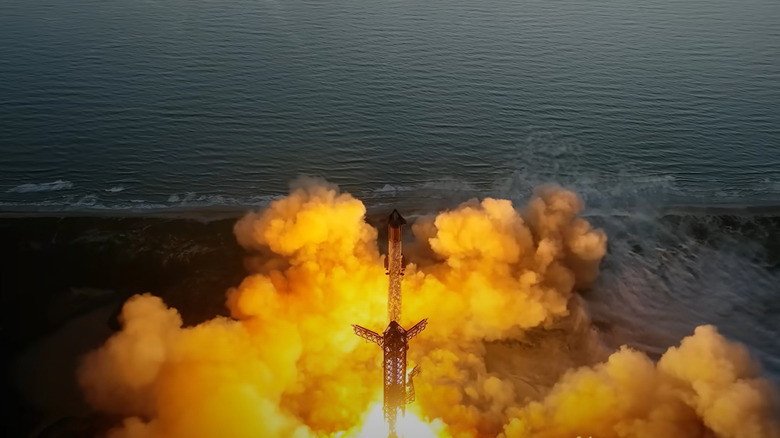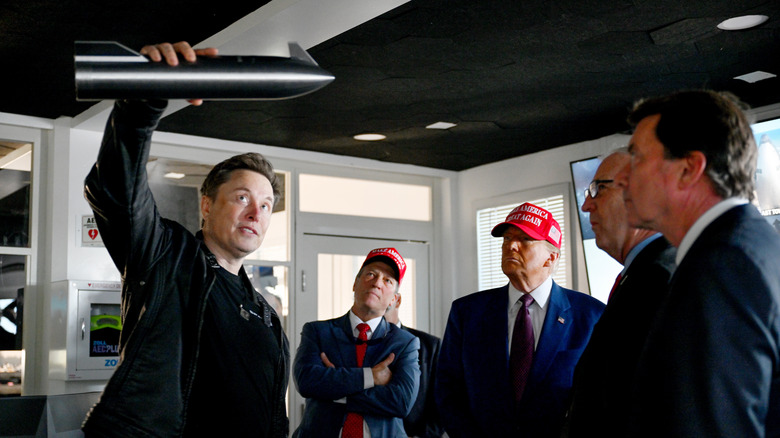How Many SpaceX Rockets Have Exploded So Far In 2025?
When a SpaceX Starship rocket went up in a fiery explosion in June 2025, it amplified criticism regarding the company's recent string of test failures. This was the fourth straight failure of the Elon Musk-led company's Starship rocket, which is set to play a crucial role in NASA's upcoming lunar landing mission set for 2027 — a contract that netted SpaceX $4 billion. Unfortunately, these mishaps have occurred at a critical juncture for SpaceX, as the company plans to significantly ramp up its launches.
On top of that, rumors that SpaceX will join the United States' Golden Dome missile defense system, and its goals of leaving for Mars by 2026, have elevated scrutiny of the Austin-based space giant. Some regulators expressed concern about the unsuccessful launches, with the FAA ordering an investigation in January 2025 and Mexican President Claudia Sheinbaum threatening to sue the company over contamination caused by launch debris. Musk, conversely, has shrugged off the mishaps, calling the June 2025 explosion "just a scratch" on X.
Much of the concern is a matter of optics: high-profile explosions of SpaceX rockets take on new meaning when the stated goal is interplanetary settlement. With visions of settlers on the first mission to Mars firmly in SpaceX's sightlines, it's no wonder the public is more concerned with SpaceX's headline-grabbing disasters than the 430-plus successful landings of its Falcon 9. However, with five explosions this year alone, many are beginning to speculate about the toll these failures may take on the world's most lucrative space company.
A near flawless record, with notable hiccups
While SpaceX rockets' failures bombard the news cycle whenever their rockets scatter across the ocean, the company boasts an impressive success rate, with the Falcon 9 holding a 99% launch success rate since 2010. The latest version maintained a flawless record between May 2018 and July 2024, with nearly 300 launches occurring without a hitch.
SpaceX has launched 96 Falcon 9s, the backbone of its Starlink satellite program, as of July 2025. One of these exploded in space, with SpaceX losing another Falcon as it landed from a successful mission. The first was in February 2025, when a Falcon 9 rocket carrying 22 Starlink satellites experienced a liquid oxygen leak, disrupting the rocket's deorbit processes and resulting in fiery debris falling over Poland. In the other instance, an otherwise successful Starlink mission ended when a damaged booster tipped the Falcon 9 onto its side during landing.
The main issue in 2025 has been the world's most powerful rocket, SpaceX's Starship program. Designed to carry passengers to extraterrestrial destinations, Musk stated in March 2025 that SpaceX aims to send its Starship rocket to Mars by the end of 2026, with a potential landing date between 2029 and 2031. Unfortunately, recent results may suggest otherwise. Thus far, four straight Starship launches have ended in explosions. The most recent of which occurred in June 2025, at its Starbase site in Massey, Texas, raising the company's yearly total to five. For reference, the global space community saw six failed orbital launches in 2024. SpaceX, however, remains undeterred, firing up the latest Starship test on July 31, 2025.
What these failures mean for SpaceX
Typically, SpaceX publicly hails mission failures as learning experiences. SpaceX's success makes it difficult to argue against Musk's "fail fast, learn fast" mindset, as the company accounted for over half of the world's successful orbital launches in 2024. Some experts, however, question whether this will be the case for the Starship program. Starship launches are likely more expensive than the Falcon 9's $67 million price tag, with some estimating each launch costs around $100 million.
Environmental concerns have begun to add financial risks, evidenced by the Bahamas' pause of its Falcon 9 landing deal after a Starship explosion cascaded debris across the island. Add mounting delays caused by regulatory investigations, and each successive explosion paints a worrisome financial picture. Musk stated in 2019 that the total program would cost up to $10 billion; the program reportedly already passed the $5 billion mark in 2023.
The biggest consequence, however, may be that these explosions tarnish SpaceX's veneer of invincibility as it ventures towards a time of immense economic potential amidst intense public scrutiny. Already, SpaceX appears unlikely to meet NASA's 2027 Artemis deadline. Earlier this year, SpaceX delayed a critical demonstration, fueling further speculation. Despite these setbacks, NASA remains bullish on the project, awarding Starship a launch services contract in March 2025. Billions more could be on the line in the coming months, with Reuters reporting that President Trump's June 2025 review of SpaceX contracts could cost the company $22 billion. Whether confidence in SpaceX can withstand more fiery explosions may become an increasingly important question as the company ventures into the second half of one of its most important years yet.


